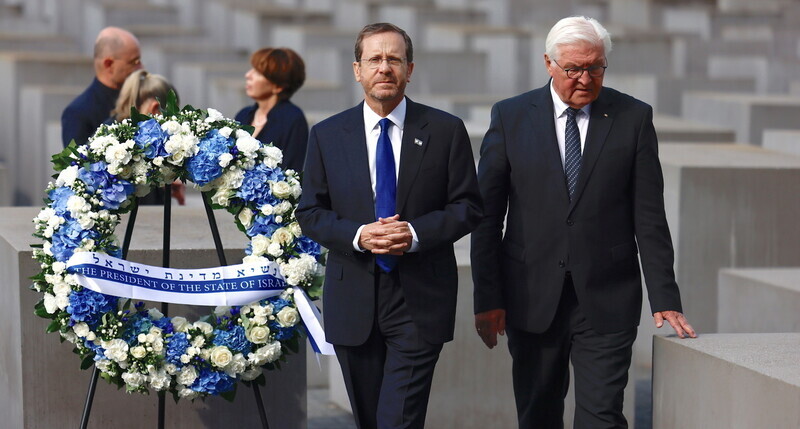hankyoreh
Links to other country sites 다른 나라 사이트 링크
Germany offers lessons for remembering atrocities - Japan should take them

On Sept. 15, the German government, which has long been reflecting on the country’s past Nazi war crimes, once again announced additional compensation and reparation measures for Jewish victims of the Holocaust.
Germany will be providing 1.3 billion euros for old age care for 280,000 Holocaust survivors, including 8,500 Jews from Ukraine who fled their country as a result of Russia’s invasion.
It is a well-known fact that Germany has continuously been providing compensation and reparations for the war crimes committed during the Holocaust, crimes that included the use of concentration camps and mass slaughter, ever since the country signed the so-called Luxembourg Agreements with the Israeli government and Jewish organizations in September 1952.
With the signing of the agreements, Germany acknowledged its responsibility for the genocide of Jews and agreed to provide compensation and reparations to individual victims. Ever since, Germany has paid more than 80 billion euros in compensation and reparations to Jewish victims.
In addition, Germany also established the Foundation Remembrance, Responsibility and Future in 2000 and paid 4.4 billion euros to 650,000 victims in 89 countries.
Germany's attitude is in sharp contrast to Japan's attitude of “playing dumb.” According to Japan, the historical issues with Korea are problems that have “already been resolved through the 1965 Treaty on Basic Relations Between Japan and South Korea,” despite the fact that South Korea’s Supreme Court recently issued a judgment calling for the compensation of victims of forced labor during the Japanese colonial period.
To make matters worse, Japan even took retaliatory measures by using the Supreme Court ruling as a pretext to impose export controls on semiconductor parts to South Korea.
Despite the current German response, however, the country has not always acknowledged its past mistakes or actively provided compensation or reparations to victims.
In fact, in the immediate aftermath of World War II, the prevailing atmosphere in German society was one of trying to turn away from the past and wanting to forget what had happened.
At the time of the signing of the Luxembourg Agreements, only 11% of the German public was in favor of providing compensation for the damage done to the Jewish people. The German business community even lobbied against the idea, arguing instead that compensation and reparations for Jews could affect business with Arab countries in a negative way.
At the time, Chancellor Konrad Adenauer had to pass the agreements in hopes of getting votes in favor from progressive forces such as the opposition Social Democrats, given the opposition to the agreements from members of the conservative Christian Democratic Union, the conservative ruling party at the time.
Since then, however, the horrors of the Holocaust have become widely known to the public and the sense of a need to take moral and historical responsibility for Nazi crimes has become the consensus in German society.
On Sept. 15, Germany also announced plans to provide about 100 million euros for historical education over the next three years. The plan is said to be a response to recent polling data that revealed a majority of youngsters in the US and Europe don’t actually know that much about the Holocaust.
Regarding this, Chancellor Olaf Scholz of Germany underscored the growing importance of educating young people about Nazi war crimes since fewer and fewer survivors are remaining to testify to the horrors of the Holocaust.”
Similarly, German Finance Minister Christian Lindner said, “We bear no individual guilt today but we have a moral obligation and a historic responsibility for what was done in the name of Germany and the name of the German people,” adding, “Our responsibility is also to preserve the memory of the Shoah.”
This is a very different perspective on history from that of former Japanese Prime Minister Shinzo Abe, who shamelessly insisted that Japan “will no longer apologize” concerning the “comfort women” agreement.
By Park Byong-su, senior staff writer
Please direct questions or comments to [english@hani.co.kr]

Editorial・opinion
![[Editorial] Does Yoon think the Korean public is wrong? [Editorial] Does Yoon think the Korean public is wrong?](https://flexible.img.hani.co.kr/flexible/normal/500/300/imgdb/original/2024/0417/8517133419684774.jpg) [Editorial] Does Yoon think the Korean public is wrong?
[Editorial] Does Yoon think the Korean public is wrong?![[Editorial] As it bolsters its alliance with US, Japan must be accountable for past [Editorial] As it bolsters its alliance with US, Japan must be accountable for past](https://flexible.img.hani.co.kr/flexible/normal/500/300/imgdb/original/2024/0417/6817133413968321.jpg) [Editorial] As it bolsters its alliance with US, Japan must be accountable for past
[Editorial] As it bolsters its alliance with US, Japan must be accountable for past- [Guest essay] Amending the Constitution is Yoon’s key to leaving office in public’s good graces
- [Editorial] 10 years on, lessons of Sewol tragedy must never be forgotten
- [Column] A death blow to Korea’s prosecutor politics
- [Correspondent’s column] The US and the end of Japanese pacifism
- [Guest essay] How Korea turned its trainee doctors into monsters
- [Guest essay] As someone who helped forge Seoul-Moscow ties, their status today troubles me
- [Editorial] Koreans sent a loud and clear message to Yoon
- [Column] In Korea’s midterm elections, it’s time for accountability
Most viewed articles
- 1[Column] The clock is ticking for Korea’s first lady
- 2[Editorial] When the choice is kids or career, Korea will never overcome birth rate woes
- 3S. Korea, Japan reaffirm commitment to strengthening trilateral ties with US
- 4Samsung barricades office as unionized workers strike for better conditions
- 5[Guest essay] How Korea turned its trainee doctors into monsters
- 6Gangnam murderer says he killed “because women have always ignored me”
- 7Japan officially says compensation of Korean forced laborers isn’t its responsibility
- 8[Editorial] As it bolsters its alliance with US, Japan must be accountable for past
- 9Korea, Japan jointly vow response to FX volatility as currencies tumble
- 10[Column] “Hoesik” as ritual of hierarchical obedience